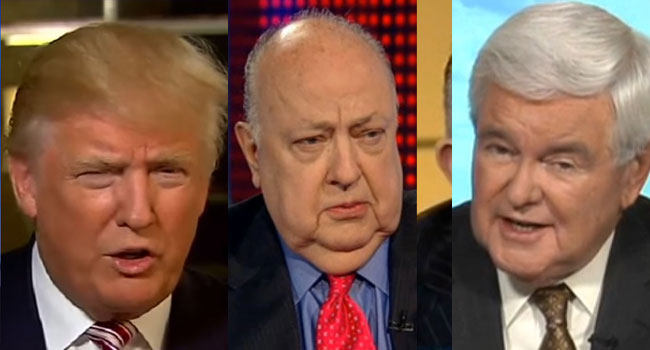
b
What do most of the chief advisers and surrogates of the Trump campaign have in common? I’m thinking of Chris Christie, Roger Ailes, Stephen Bannon, Rudy Giuliani, Newt Gingrich.
What could possibly unite this diverse group? They are white, middle-aged (and older) males — not that there is anything wrong with that. They are almost psychotically sycophantic. (According to Gingrich, Donald Trump won an “enormous, historic victory” in the first presidential debate. Both Christie and Giuliani have called Trump a “genius” for avoiding federal taxes.) They are very forgiving about certain foibles (“everybody” commits adultery, explains Giuliani) and rather tough on others (Miss Universe Alicia Machado, says Gingrich, was “not supposed to gain 60 pounds”). They apparently lack the gene for irony (“America’s mayor” is smitten with a candidate who has flirted with 9/11 conspiracy theories).
But most of all, they are very unhappy about the state of America. “There’s no next election,” Giuliani has declared. “This is it! There is no more time for us left to revive our great country.”
The ascendance of people such as Gingrich, Giuliani and Trump in the Republican Party, from one perspective, is succeeding. A campaign of shouting, apocalyptic, white men has undeniably appealed to white men. A recent Post-ABC News poll found Trump up 40 points against Hillary Clinton in this category. Up nearly 60 points among white men with no college degree. These results are remarkable, indicating both the limits of Clinton as a candidate and the fury in portions of middle-class and blue-collar America.
If the United States is truly in the midst of a wave election, fed by the fears and discontent of white males, it will have enormous consequences in a country that has moved considerably in the direction of diversity, tolerance and inclusion. A very real culture war will be in full swing, not between social conservatives and social liberals, but between a movement of white economic and cultural grievances and a party of social elites and ascendant minorities. This struggle — rooted in race and class — would be far more bitter than the old culture war of ideas.
Trump is an odd leader for this populist revolt. Every presidential candidate presents not just a vision of the future but a certain construction of the past — both Millennium and Eden. Ronald Reagan’s ideal, even though he was a product of Hollywood, was the small-town Midwest. For George W. Bush (who chewed tobacco in the back of the class at Harvard Business School), Eden was always West Texas.
What is the mythic content of Trump’s nostalgia? In the telling of PBS’s excellent political documentary “The Choice,” the young Trump was captured by Norman Vincent Peale’s optimistic self-confidence and Hugh Hefner’s vision of the good life. “He had a very Hugh Hefner, Playboy magazine view of success,” recalls classmate Michael D’Antonio. Others left the Playboy philosophy behind along with their adolescence. Trump did not.
Trump’s version of Eden is lounging at the grotto at the Playboy Mansion or smoking cigars in the back room at the Sands, with a little Studio 54 thrown in. This is the man who reportedly pressured his future wife Marla Maples to appear in Playboy and negotiated the deal; who appeared in a soft-core porn video himself (not naked, thank goodness, but breaking a champagne bottle over a limo); and who recently took to Twitter to urge Americans to view a sex tape. This is the man who boasted about his penis size and made a menstruation joke during debates and has a consistent history of demeaning women as “pigs” and “dogs.”
America is seeing a movement of white grievance led by an avatar of the Playboy philosophy. In light of this, Trump’s deep support among evangelical Christians is the hardest for me to account for. I wonder how Trump evangelicals explain to their sons and daughters that this man is a suitable leader for a great country. I know that people in some minority groups are genuinely frightened by the possibility of Trump’s election. (“We should frankly test every person here who is of a Muslim background,” Gingrich has said, “and if they believe in sharia, they should be deported.”) I also know that if Trump ends up losing in November, it will be because women rallied in large numbers to defeat him.
Conservatives oriented toward reform and outreach — longing for the leadership of Nikki Haley, Tim Scott and Marco Rubio — are largely waiting in shelters for the storm to pass. But what of the Republican Party will be left?



